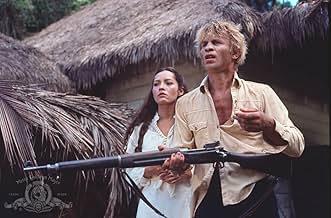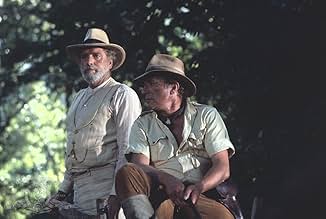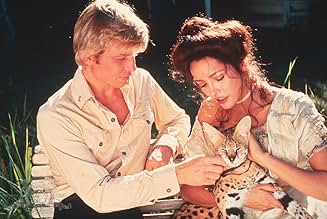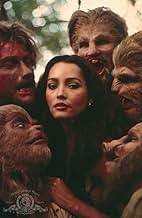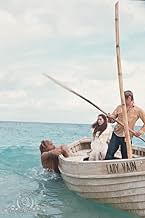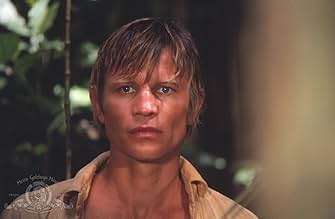IMDb रेटिंग
5.9/10
7.7 हज़ार
आपकी रेटिंग
अपनी भाषा में प्लॉट जोड़ेंA shipwrecked survivor discovers a remote island owned by a crazed scientist who is carrying out sinister experiments on the island's inhabitants.A shipwrecked survivor discovers a remote island owned by a crazed scientist who is carrying out sinister experiments on the island's inhabitants.A shipwrecked survivor discovers a remote island owned by a crazed scientist who is carrying out sinister experiments on the island's inhabitants.
- पुरस्कार
- 6 कुल नामांकन
फ़ीचर्ड समीक्षाएं
There's three principal reasons why this HG Wells' inspired horror adventure works, firstly the distinguished cast led by A-graders Michael York (as the shipwrecked engineer) and Burt Lancaster, as the reclusive title character whose gene experiments on the local animal population is resulting in terrible mutations trapped amid instincts that lay somewhere between man and animal, a precariously distorted eco-system.
Nigel Davenport plays the boozy mercenary protecting the island establishment from its own macabre experiments, while Richard Basehart is a transformed animal, human enough to be the law sayer and peace-keeper of the mutated island population. Then there's the ravishing Barbara Carrera as a naive orphan brought to the island as a child by Moreau, besotted by the chivalrous York, but equally mysterious like her young lynx companion. Nick Cravat and Dave Cass have minor supporting roles as manimals of various pedigree.
The second reason to tune in is the set design and make-up effects in which luminaries John Chambers and Dan Striepeke were involved. Moreau's half-breed experiments are impressively brought to life by Chambers' crew, the full effect more evident on close-up, particularly on the unrecognisable Basehart.
Finally, if it needs to be defended, the production of Samuel Z.Arkoff and Sandy Howard should please some, their AIP distribution lending a certain B-movie prestige, a badge that will in itself, attract a legion of fans (but equally, render others suspicious of the quality). Overall, while there were a plethora of plot-holes to be found, and the conclusion a little simplistic, the general tone and quality of the film remained highly entertaining, uncomplicated and straightforward, something the 1996 remake couldn't muster in spite of its (by relative standards) gold plated production.
Nigel Davenport plays the boozy mercenary protecting the island establishment from its own macabre experiments, while Richard Basehart is a transformed animal, human enough to be the law sayer and peace-keeper of the mutated island population. Then there's the ravishing Barbara Carrera as a naive orphan brought to the island as a child by Moreau, besotted by the chivalrous York, but equally mysterious like her young lynx companion. Nick Cravat and Dave Cass have minor supporting roles as manimals of various pedigree.
The second reason to tune in is the set design and make-up effects in which luminaries John Chambers and Dan Striepeke were involved. Moreau's half-breed experiments are impressively brought to life by Chambers' crew, the full effect more evident on close-up, particularly on the unrecognisable Basehart.
Finally, if it needs to be defended, the production of Samuel Z.Arkoff and Sandy Howard should please some, their AIP distribution lending a certain B-movie prestige, a badge that will in itself, attract a legion of fans (but equally, render others suspicious of the quality). Overall, while there were a plethora of plot-holes to be found, and the conclusion a little simplistic, the general tone and quality of the film remained highly entertaining, uncomplicated and straightforward, something the 1996 remake couldn't muster in spite of its (by relative standards) gold plated production.
... although any limitations on what could have been shown or done were much more lax in this film 44 years later. Yet I just like the original better.
This is another take on the H. G. Wells novel about the "mad" scientist experimenting with animals on a South Seas island, performing surgery on them in "the House of Pain" to try to transform them into human beings. Of course, things never go as planned in these films. Moreau is, after all, "tampering in God's domain" (though that hoary old expression is mercifully not used in this film).
Difficult to not compare this version to the first adaption, 1933's Island of Lost Souls, which I find far more satisfactory. In the original Charles Laughton brought a creepy, perverse quality to his Moreau. He was unsettling but effective, and when he cracked that whip in the "What is the law?" scene with the man beasts there was more than a hint of the sadist about him.
The surprising casting of Burt Lancaster as Moreau in the 1977 version fails to bring any of these same odious qualities to the film. It's difficult to work up much of a dislike for Lancaster's scientist in spite of his activities. He's still Burt, and he has to battle against his good guy screen persona.
Island of Dr. Moreau also surprisingly jettisons one of the kinkiest aspects of the 1933 film, the Panther Girl, as originally played by Kathleen Burke, his most near perfection human like creation from a beast, with whom Laughton's Moreau is eager to see if an unsuspecting male shipwrecked on his island (Richard Arlen) will be willing to mate.
The '77 version does have beautiful Barbara Carrera slinking around, and she certainly intrigues (well, more than intrigues) Michael York, now in the Arlen role. Lancaster is aware that they are sexually attracted to each other and ready to mate - but to what purpose, since it turns out Carrera is a normal human, and no kind of Panther Girl. There is a hint in her final scene, however, that she may not be quite so normal, after all, but it went by so quickly I wasn't quite certain if it was my imagination.
The man beasts in the original are more effective than here. For starters, you didn't get a really good look at the makeup in the original (outside of a closeup of Bela Lugosi), so much of it is left to the audience's imagination. In the '77 version you see the makeup and, to be honest, it's not so much frightening as it is artificial in appearance (on about a par with that to be found in the original Planet of the Apes).
The '77 version, however, interestingly, does show what happens to the man beasts after everything blows up on the island, something the '33 original left to our imagination. This version also has Moreau strapping down and experimenting with York, something not done in the '33 version. That is one of the more interesting aspects of this production, as well.
In the final analysis, this is a fairly mediocre adaption of the Wells story, but one should still see it to make his own assessment. There would be another version with Brando almost 20 years later, of course. It's been too long since I've seen that version to talk about it, though I do recall disliking it at the time.
This is another take on the H. G. Wells novel about the "mad" scientist experimenting with animals on a South Seas island, performing surgery on them in "the House of Pain" to try to transform them into human beings. Of course, things never go as planned in these films. Moreau is, after all, "tampering in God's domain" (though that hoary old expression is mercifully not used in this film).
Difficult to not compare this version to the first adaption, 1933's Island of Lost Souls, which I find far more satisfactory. In the original Charles Laughton brought a creepy, perverse quality to his Moreau. He was unsettling but effective, and when he cracked that whip in the "What is the law?" scene with the man beasts there was more than a hint of the sadist about him.
The surprising casting of Burt Lancaster as Moreau in the 1977 version fails to bring any of these same odious qualities to the film. It's difficult to work up much of a dislike for Lancaster's scientist in spite of his activities. He's still Burt, and he has to battle against his good guy screen persona.
Island of Dr. Moreau also surprisingly jettisons one of the kinkiest aspects of the 1933 film, the Panther Girl, as originally played by Kathleen Burke, his most near perfection human like creation from a beast, with whom Laughton's Moreau is eager to see if an unsuspecting male shipwrecked on his island (Richard Arlen) will be willing to mate.
The '77 version does have beautiful Barbara Carrera slinking around, and she certainly intrigues (well, more than intrigues) Michael York, now in the Arlen role. Lancaster is aware that they are sexually attracted to each other and ready to mate - but to what purpose, since it turns out Carrera is a normal human, and no kind of Panther Girl. There is a hint in her final scene, however, that she may not be quite so normal, after all, but it went by so quickly I wasn't quite certain if it was my imagination.
The man beasts in the original are more effective than here. For starters, you didn't get a really good look at the makeup in the original (outside of a closeup of Bela Lugosi), so much of it is left to the audience's imagination. In the '77 version you see the makeup and, to be honest, it's not so much frightening as it is artificial in appearance (on about a par with that to be found in the original Planet of the Apes).
The '77 version, however, interestingly, does show what happens to the man beasts after everything blows up on the island, something the '33 original left to our imagination. This version also has Moreau strapping down and experimenting with York, something not done in the '33 version. That is one of the more interesting aspects of this production, as well.
In the final analysis, this is a fairly mediocre adaption of the Wells story, but one should still see it to make his own assessment. There would be another version with Brando almost 20 years later, of course. It's been too long since I've seen that version to talk about it, though I do recall disliking it at the time.
I watched this movie by accident, due to a last-minute program change by the TV station. I had missed the first couple of minutes including the title, so I was just as unprepared as the shipwrecked Andrew (Michael York) when he set foot on this beautiful tropical island. To his horror, he finds out that an aging scientist, presumed long dead by the world, has populated the island with his "children," the results of his experiments in combining human and animal genes. What I found most astonishing was the authentic feel to the characters. Starting with Andrew. His initial repulsion develops into a discerning appreciation, without ever condoning the monstrosity of Dr. Moreau's project. The old scientist himself (Burt Lancaster, a rather shallow performance in comparison) is not an evil lunatic but a genius who got carried away, convinced to the end of his own noble goals and best intentions. However, the most amazing aspect is the differentiated portrayal of Moreau's more or less "successful" creatures. The movie manages to make your heart go out for them in their struggle to be human against their nature. The most poignant moment is the Lionman's farewell cry for his Master. An overall very satisfying movie, despite some weaknesses in the development of the plot towards the end (it feels like the director suddenly ran out of time). Quality science-fiction with good entertainment value. 7/10
Especially if you don't know what this movie is about before you're going to watch it, you'll be gripped by its mysterious and tense build up.
To be frank, this movie has one of the best and most tense story build ups I have seen in a long time. For a long time it remains unclear what exactly is going on and what the movie will be about. As the movie progresses the movie does loose some of its power and tension, when it falls into some obvious clichés and formulaic genre elements, plus some just plain odd and poorly done sequences. But all is forgiven. All in all this version of the H.G. Wells remains a well done one, with plenty of enough tense and mysterious moments in it, which absolutely makes this movie distinct itself from other genre movies. In a way the movie and its build up and atmosphere really reminded me of "Planet of the Apes (1968)"
The build up and atmosphere is amazing in the first halve. It doesn't use any fancy tricks but leaves lots of things up to the viewers own imagination. The second halve is however quite different and in fact is nothing more than a typical genre piece from the '70's. Everything gets explained but at the same time everything also is far from believable. The horror/monster elements are hardly refreshing or new and in a way degrade the story- and the movie in general. It definitely makes the second halve of the movie not as good as the first but the first halve builds up so many things in a great way, that the second halve can't really ruin it that much. "The Island of Dr. Moreau" at all times remains a perfectly good watchable movie that is unique and a standout in its genre.
Burt Lancaster does a good job at keeping his role simple and mysterious. Michael York works out way better as the main hero than you at first would expect.
The settings are nice and so is the rest of the visual look. The make-up effects might look perhaps a bit outdated in todays perspective but they're actually quite above par. Also the musical score from Laurence Rosenthal is surprising great and works effective in the movie.
Just forget the '96 version. This movie is in my opinion surprisingly a real must-see!
8/10
http://bobafett1138.blogspot.com/
To be frank, this movie has one of the best and most tense story build ups I have seen in a long time. For a long time it remains unclear what exactly is going on and what the movie will be about. As the movie progresses the movie does loose some of its power and tension, when it falls into some obvious clichés and formulaic genre elements, plus some just plain odd and poorly done sequences. But all is forgiven. All in all this version of the H.G. Wells remains a well done one, with plenty of enough tense and mysterious moments in it, which absolutely makes this movie distinct itself from other genre movies. In a way the movie and its build up and atmosphere really reminded me of "Planet of the Apes (1968)"
The build up and atmosphere is amazing in the first halve. It doesn't use any fancy tricks but leaves lots of things up to the viewers own imagination. The second halve is however quite different and in fact is nothing more than a typical genre piece from the '70's. Everything gets explained but at the same time everything also is far from believable. The horror/monster elements are hardly refreshing or new and in a way degrade the story- and the movie in general. It definitely makes the second halve of the movie not as good as the first but the first halve builds up so many things in a great way, that the second halve can't really ruin it that much. "The Island of Dr. Moreau" at all times remains a perfectly good watchable movie that is unique and a standout in its genre.
Burt Lancaster does a good job at keeping his role simple and mysterious. Michael York works out way better as the main hero than you at first would expect.
The settings are nice and so is the rest of the visual look. The make-up effects might look perhaps a bit outdated in todays perspective but they're actually quite above par. Also the musical score from Laurence Rosenthal is surprising great and works effective in the movie.
Just forget the '96 version. This movie is in my opinion surprisingly a real must-see!
8/10
http://bobafett1138.blogspot.com/
There exist several film version of H.G. Wells' famous tale, including a very old one starring Charles Laughton & Bela Lugosi, and the much more known and hyped 90's version starring Marlon Brando. This 70's version is the most obscure of the bunch, but it certainly should appeal to horror fanatics as well as to admirers of Wells' writings. The 70's way of film-making (gritty special effects, cheap atmosphere of sleaze, violence
) fits the story very well because it basically is a very grotesque, far-fetched and strangely unsettling political allegory. Burt Lancaster this time depicts, impressively I may add, the titular "mad" scientist, Nigel Davenport stars as his unaware accomplice Montgomery and the intruding castaway Adrew Braddock is no less than Michael York; a personal favorite of mine. As everyone probably knows, Dr. Moreau lives isolated because his genetic research and experiments aren't exactly easy to justify. Convinced that the basic DNA of whatever living species can be altered into any other species of preference, Moreau's island runs full of guinea pigs. The wild animals he attempts to turn into people are subjected to human laws and whoever breaks the rules will be punished harshly. Braddock disapproves of his work and when he also shows a romantic interest in Moreau's gorgeous wife Maria, he becomes next in line for a whole new different and risky type of experiment. The tropical island setting is magnificent and the production definitely benefices from sublime camera-work and enchanting music. The costumes and make-up effects aren't particularly menacing (the guinea pigs actually look like ancestors of the Ewoks) but the last half hour is exhilaratingly violent and Dr. Moreau's ultimate fate is truly nightmarish, even for a cruel being like him.
क्या आपको पता है
- ट्रिवियाDuring the fight between the bullman and the tiger, the animal actually took the stuntman's head in his jaws. Luckily he was wearing a fiberglass helmet which protected him.
- गूफ़During the opening scene when the boat is being pushed ashore you can see the shadow of the boom mic in the water's edge.
- भाव
Sayer of the Law: [about Moreau] His is the hand that makes. His is the hand that hurts. His is the hand that heals. His is the House of Pain. His is the House of Pain. His is the House of Pain. He who breaks the law shall be punished back to the House of Pain.
- कनेक्शनFeatured in A Century of Science Fiction (1996)
- साउंडट्रैकDer Vogelfänger bin ich ja
(Papageno's Aria from "Die Zauberflöte" K.620)
Written by Wolfgang Amadeus Mozart
टॉप पसंद
रेटिंग देने के लिए साइन-इन करें और वैयक्तिकृत सुझावों के लिए वॉचलिस्ट करें
विवरण
- रिलीज़ की तारीख़
- कंट्री ऑफ़ ओरिजिन
- आधिकारिक साइट
- भाषा
- इस रूप में भी जाना जाता है
- Die Insel des Dr. Moreau
- फ़िल्माने की जगहें
- St. Croix, U.S. Virgin Islands(location)
- उत्पादन कंपनियां
- IMDbPro पर और कंपनी क्रेडिट देखें
बॉक्स ऑफ़िस
- बजट
- $60,00,000(अनुमानित)
इस पेज में योगदान दें
किसी बदलाव का सुझाव दें या अनुपलब्ध कॉन्टेंट जोड़ें


